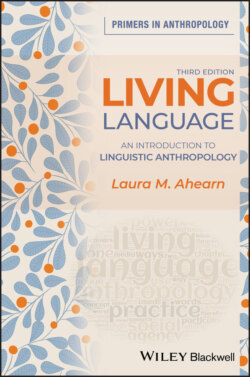Читать книгу Living Language - Laura M. Ahearn - Страница 41
What Kinds of Research Questions Do Linguistic Anthropologists Formulate?
ОглавлениеAll research starts with one or more questions. Sometimes, these questions are rather inchoate in the mind of the researcher; other times, they are clearly articulated in grant proposals. At the outset of research, however, a scholar must be curious about something – and in linguistic anthropology this “something” usually concerns how language reflects and/or shapes some aspect of social life. Indeed, as noted in Chapter 1, this focus on language in real-life settings distinguishes linguistic anthropologists from many other scholars in fields such as linguistics or psychology who might be interested in language. As a result, the types of research questions linguistic anthropologists ask differ from those of most linguists, sociolinguists, cultural anthropologists, and other social scientists.
The specific formulation of any scholar’s research question may change as the research gets underway. This is also true for linguistic anthropologists because, as will be described below, many linguistic anthropologists conduct long-term fieldwork, often in very different cultural and linguistic settings than the researcher’s own, and such fieldwork can end up challenging the researcher’s initial assumptions. Like researchers from other fields such as cultural anthropology, linguistic anthropologists incorporate insights from their fieldwork into their research questions so that they more accurately reflect the way that the research subjects themselves talk or think about a certain topic. The research question can therefore often be a work in progress.
In Chapter 1, I summarized six ethnographies written by linguistic anthropologists. What follows is a list of some research questions these books and several others address:
How do place names and their use in conversations both illustrate and reinforce important Apache social relations and cultural values (Basso 1996)?
What do the arguments, storytelling episodes, and gossip of African American girls and boys tell us about the gendered nature of conversations and the ability of children to create rich, complex social worlds (Goodwin 1990)?
How does the use of Spanish and English among Puerto Ricans shed light on unequal racial, ethnic, political, and economic relations in New York City (Urciuoli 1996)?
In what ways does the presence or absence of a particular grammatical marker in Samoan political speeches and everyday conversations strengthen existing power relations (Duranti 1994)?
How do minority languages like Catalan come to be seen as authoritative? In what ways are people’s linguistic practices challenging naturalistic ideologies (Woolard 2016)?
What are the multiple meanings of “troubles talk” and complaints, including the special genre of laments, in Bangladesh, and how do they shed light on people’s conceptions of illness (especially mental illness), emotion, and gender (Wilce 1998)?
How are race and language linked and naturalized in ways that powerfully shape everyday life for Latinx high schoolers in Chicago (Rosa 2019)?
How does the use of “Mock Spanish” (such as “hasta la vista, baby,” or, “mañana”) by native English speakers both directly and indirectly index the speakers’ attitudes about Spanish speakers (Hill 1998, 2005, 2008)?
How does a new literacy practice such as love-letter writing contribute to changing marriage practices, shifting gender relations, and other social transformations taking place in Nepal (Ahearn 2001a)?
How do “Beijing yuppies” draw on innovative stylistic resources in Mandarin to create a new cosmopolitan Chinese identity (Zhang 2018)?
What are the causes and implications of the almost complete eradication of a form of Irish Sign Language that used to be used solely by women (LeMaster 2006)?
In what ways does singing intersect with literacy and orality in Mazatec ethnic and linguistic revival in Mexico (Faudree 2013)?
How do spoken, written, and illustrated acts of commemoration performed in and around the visitor books at Israel’s Ammunition Hill site contribute to gendered ideologies of the nation (Noy 2015)?
Of course, these might not have been the questions these researchers entered the field to study since, in many cases, the insights that linguistic anthropologists gain from their initial fieldwork redirect their inquiries in unanticipated ways – an approach that some scholars call “grounded theory.”1 Nevertheless, the list demonstrates the extent of the diversity in topics researched by linguistic anthropologists. Such a wide range of foci requires a correspondingly broad array of research methods in order to collect the appropriate kind of information for answering particular research questions.
